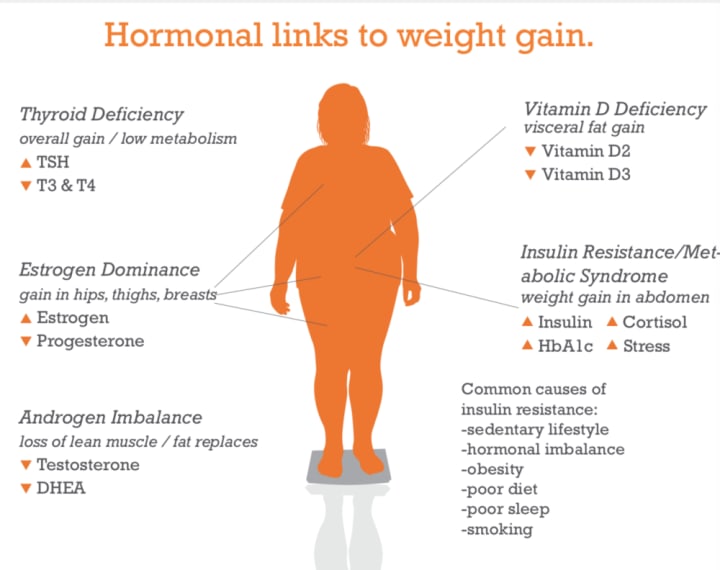THE ROLE OF HORMONES IN WEIGHT LOSS
SCIENTIFIC INSIGHTS


TITLE: THE ROLE OF HORMONES IN WEIGHT LOSS: SCIENTIFIC INSIGHTS
INTRODUCTION:
Weight loss has been a perennial concern for many individuals striving to lead a healthier and more fulfilling life. In the world today, obesity is a major public health issue with over 1.9 billion overweight adults globally. The condition is associated with many chronic conditions such as heart disease, diabetes, and hypertension. Over the years, there have been various weight loss programs in the market, but not all of them have been successful. Hormones have been found to play a significant role in weight loss, while diet and exercise have always been the go-to methods for shedding excess pounds, recent scientific research has uncovered another crucial factor that plays a significant role in weight loss: hormones. Understanding the intricate interplay between hormones and weight management can offer valuable insights into effective and sustainable strategies for achieving weight loss goals. In this article, we delve into the fascinating world of hormones and their impact on weight loss, providing you with scientific insights that can transform your approach to shedding those stubborn pounds.
What are Hormones?
Hormones refer to chemical messengers produced by various glands in the body. Hormones regulate various processes in the body, including metabolism, growth, reproduction, and mood. The endocrine system is responsible for producing hormones in the body, and any changes in the levels of hormones can cause various health problems.
Overview of Hormones Involved in Weight Loss
Various hormones play a significant role in weight loss, and in this section, we will discuss the main hormones involved.
1. Leptin: The Satiety Hormone:
At the forefront of hormone-driven weight loss is leptin, commonly known as the "satiety hormone." Produced by fat cells, leptin acts as a signal to the brain, indicating that the body has had enough to eat. Leptin is a hormone produced by fat cells in the body and is responsible for regulating hunger and metabolism. The hormone sends signals to the brain indicating whether the body needs food or not. Leptin levels are high in obese individuals, and this may cause leptin resistance, where the brain no longer responds to the hormone signals.
However, some individuals develop a condition called leptin resistance, wherein their bodies fail to respond to the hormone's signals. This can lead to overeating and subsequent weight gain. Scientific studies have shown that by regulating leptin levels through lifestyle modifications, such as getting sufficient sleep, managing stress, and consuming a balanced diet, individuals can enhance their body's responsiveness to leptin, facilitating weight loss. Studies have shown that people who are obese have high levels of leptin in their bloodstreams, making it harder for them to lose weight.
2. Ghrelin: The Hunger Hormone:
Ghrelin, often referred to as the "hunger hormone," works in opposition to leptin. Produced primarily in the stomach and is responsible for regulating hunger. The hormone sends signals to the brain indicating when the body needs food. Ghrelin levels increase when the stomach is empty and decrease when the stomach is full, leading to a decrease in hunger. Ghrelin levels are high in people who are on a weight loss program, and this may lead to an increase in hunger, making it harder for them to stick to their weight loss goals. Ghrelin stimulates appetite and promotes food intake. Imbalances in ghrelin levels can make it challenging to resist cravings and control portion sizes, contributing to weight gain. However, studies have demonstrated that factors like regular exercise, consuming protein-rich meals, and incorporating foods with high fiber content can help regulate ghrelin levels, leading to reduced appetite and improved weight management.
3. Insulin: The Blood Sugar Regulator:
Insulin is a hormone produced by the pancreas that plays a critical role in regulating blood sugar levels. The hormone helps transport glucose from the bloodstream to the cells, where it is used for energy. Insulin resistance is a condition where the body no longer responds to insulin signals, leading to an increase in blood sugar levels. Insulin resistance is a significant risk factor for obesity and type 2 diabetes. While primarily associated with diabetes, insulin also affects weight loss. When insulin levels are high, the body tends to store excess calories as fat instead of utilizing them for energy. This can hinder weight loss efforts. By adopting a low-glycemic diet that minimizes blood sugar spikes and incorporating regular physical activity into their routine, individuals can optimize insulin sensitivity and promote weight loss.
4. Cortisol: The Stress Hormone:
Cortisol, known as the "stress hormone," is produced by the adrenal glands and plays a vital role in the body's response to stress. The hormone increases glucose levels in the bloodstream, leading to an increase in insulin levels. High cortisol levels have been linked to an increase in abdominal fat, which is a significant risk factor for heart disease and diabetes. Chronic stress can lead to an overproduction of cortisol, which can contribute to weight gain, particularly around the abdominal area. Engaging in stress-reducing activities such as meditation, yoga, or engaging hobbies can help lower cortisol levels, facilitating weight loss.
Scientific Insights on Hormones and Weight Loss
Over the years, scientists have conducted various studies on the role of hormones in weight loss, and the following are scientific insights on the same.
1. Leptin Resistance and Obesity
Studies have shown that obese individuals have high levels of leptin in their bloodstream, which leads to leptin resistance. Leptin resistance makes it harder for the brain to respond to the hormone signals, leading to an increase in appetite and a decrease in metabolism.
Researchers have suggested that weight loss programs should focus on reducing leptin resistance by increasing physical activity and reducing caloric intake.
2. Ghrelin and Hunger
Studies have shown that ghrelin levels increase in people who are on a weight loss program, leading to an increase in hunger levels. Researchers have suggested that weight loss programs should include a plan to reduce ghrelin levels by eating high-fiber foods and reducing stress levels.
3. Insulin Resistance and Weight Loss
Studies have shown that insulin resistance is a major risk factor for obesity and type 2 diabetes. Researchers have suggested that weight loss programs should focus on reducing insulin resistance through exercise and a healthy diet.
4. Cortisol and Belly Fat
Studies have shown that high cortisol levels are linked to an increase in abdominal fat. Researchers have suggested that weight loss programs should include stress reduction techniques such as meditation and yoga to reduce cortisol levels.
CONCLUSION:
While diet and exercise remain integral components of any weight loss journey, understanding the impact of hormones on weight management provides a fresh perspective and empowers individuals to make informed choices. By focusing on optimizing hormone levels through lifestyle modifications, including sufficient sleep, stress management, and a well-balanced diet, individuals can enhance their body's ability to shed excess weight effectively and sustainably. Incorporating these scientific insights into your weight loss strategy can pave the way for long-term success and a healthier, happier you. Take charge of your weight loss journey today by harnessing the power of hormones. However, hormones play a significant role in weight loss, and weight loss programs should focus on reducing hormone imbalances. Leptin resistance, ghrelin levels, insulin resistance, and cortisol levels have been found to have a significant impact on weight loss. It is important to note that weight loss programs should include a healthy diet, regular exercise, and stress reduction techniques for optimal results.
About the Creator
Enjoyed the story? Support the Creator.
Subscribe for free to receive all their stories in your feed. You could also pledge your support or give them a one-off tip, letting them know you appreciate their work.





Comments
There are no comments for this story
Be the first to respond and start the conversation.